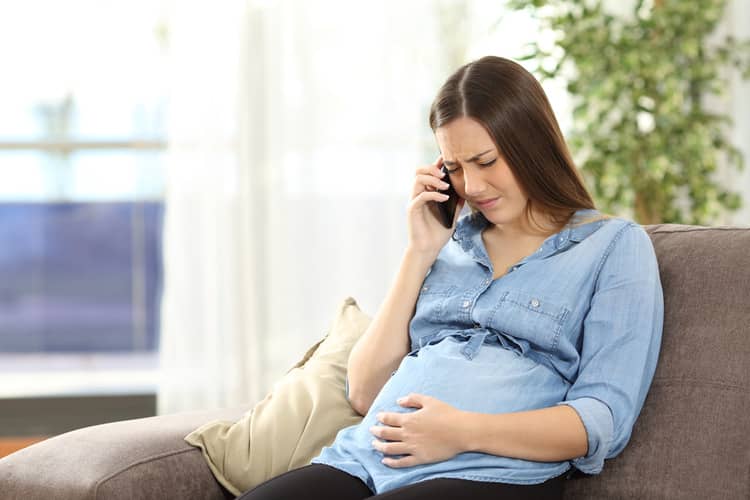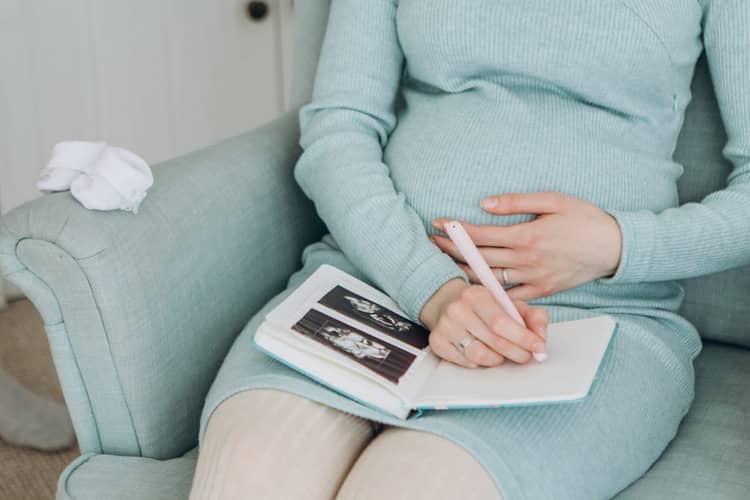
Fear of childbirth. How to overcome it?
You would hardly find a person among pregnant women who did not feel fear, stress, nervousness or lack of respect before giving birth. And we are not only talking about first-time mothers, but also about women who have already given birth one or more times. Fear of childbirth is a very natural thing and completely fine. However, there are cases when one can talk about a morbid fear of childbirth and pregnancy. There is even a name phobia for such fear, the so-called tokophobia (mental disorder). This is a condition in which the fear of this life event is so extreme that it can endanger the health of the woman and the fetus. Fear of childbirth can have different causes and also manifests itself in different ways. Depending on the stage of this fear, which is the trigger, it is possible to use different options to eliminate it or reduce its manifestations. In some cases, psychological support is necessary.
The fear of childbirth can be triggered by the banal fear that the woman will not make it to the maternity hospital on time to the fear of enormous labor pains. In order for a woman to be able to work with her fear, it is necessary to identify the fear. Many women are afraid of giving birth after their initial experience was negative - the birth took a long time, a caesarean section was necessary, the contractions were unbearable for the woman or the diaphragm ruptured. Every birth is a big unknown, the psyche of a pregnant woman is working and various scenarios are going on in her head, including the worst ones. How to cope with the fear of childbirth ? Why does fear of childbirth arise in women? What is tokophobia?
Tokophobia - morbid fear of childbirth
Women who want to become mothers naturally feel a certain pressure during pregnancy, and this pressure intensifies as the due date approaches. Such feelings are completely natural, because every pregnant woman wants to give birth to a healthy child and longs for a smooth delivery. However, worldwide statistics point to the fact that up to 10% of pregnant women feel such an intense fear of childbirth that its negative manifestations can affect the course of pregnancy, the birth itself, and the postpartum state. Signs of anxiety, palpitations, dizziness, shortness of breath or trouble connecting with your baby. This is only a fraction of the negatives that the fear of childbirth brings.
The extreme fear of childbirth is professionally called tokophobia. It is a psychological disorder characterized by a morbid fear of a specific situation. In this case, it is an extreme fear of childbirth. This fear can stem from various facts. By default, it recognizes:
- Primary tokophobia – it is a fear of childbirth that develops in women without experience of childbirth. It can therefore be the fear of a future first-time mother, while it arises already during adolescence or in adulthood. For example, due to lack of education about childbirth, negative stories about childbirth, trauma from rape or abuse, depressive states (other mental disorders). Tokophobia occurs more often in women who have not yet experienced childbirth.
- Secondary tokophobia – this fear stems from a previous traumatic experience with pregnancy or childbirth. This morbid fear can stem from a negative experience – miscarriage, stillbirth, postpartum depression, extremely painful childbirth, and others. There are many causes of this type of tokophobia and it can lead to fear of another possible pregnancy.
According to a 2008 study published in the journal Obgyn Bjog, the occurrence of tokophobia is more likely in women who have already suffered from depression, anxiety, low self-esteem and self-confidence in the past.

Manifestations of tokophobia
The phobia itself affects a woman's behavior and her perception of reality, her partner and her surroundings. Depression and anxiety states usually appear in women suffering from tokophobia. In addition, in an attempt to avoid pregnancy, women also avoid sexual intercourse with their partner. In this way, they disrupt the intimate dimension of their partner relationship. In case of pregnancy, they do not feel connected with the child and do not show any enthusiasm.
They often even try to ignore the topic of pregnancy. Manifestations are also known when a woman refuses a natural vaginal birth due to fear of illness and demands a cesarean delivery. Such medical conditions and mental imbalances can contribute to a higher risk of premature birth or miscarriage. Psychological problems can even lead to suicidal tendencies, which is already a fatal consequence. The disease can be detected during regular visits to the attending physician. In the event of a phobia, the intervention of a therapist is necessary.
Causes of fear of childbirth
It is not a rule that fear, fear of childbirth or natural respect must turn into a mental illness (tokophobia). The first, second, third and subsequent pregnancies are always a specific and unrepeatable moment in a woman's life. In addition to a number of hormonal and physiological changes, pregnancy also affects a woman's psyche, and expecting a baby brings with it a number of realities that a woman perceives.
The most common causes of fear of childbirth are either fear of something unknown or, on the contrary, fear of something specific that a woman associates with childbirth. A woman may be afraid that she does not know what to expect from childbirth, what pains await her or how she will recognize the coming birth. Other women may be afraid of the contractions they have already experienced, afraid of communicating with medical personnel, afraid of tearing or naturally of complications during or after childbirth. A number of bad scenarios can cause extreme fear. Here are some of the most common reasons women fear childbirth.
- Fear that a pregnant woman will not arrive at the maternity ward on time,
- concerns due to the consequences of the possible administration of an epidural injection,
- fear of having to artificially induce labor with oxytocin,
- concerns about the release of the anal sphincter during pushing,
- fear of tearing the perineum or having to cut it (episiotomy),
- fear of labor pains and inability to cope with them,
- fear in the case of cesarean delivery,
- concerns about the onset of postpartum depression,
- fear of giving birth to a child with a birth defect,
- concerns about one's own state of health - especially in the case of a high-risk pregnancy, when a woman suffers from a certain type of disease,
- fear of medical staff - lack of communication, misunderstanding, lack of empathy.

How to overcome fear of childbirth
All these processes take place intensively in the subconscious of a woman, mother, future mother. It is important for a woman to understand that fear in this situation is not something bad, but on the contrary - it is completely normal to admit such fear. The fact that a woman is afraid of pain or that she cannot recognize the onset of labor is fine, and she has the whole 9 months to cope with such feelings and work with them. It is also appropriate to think about the fact that a woman is not alone in this situation, and many mothers-to-be or mothers of multiples are going through similar situations. There are many methods, techniques, ways and possibilities to overcome the fear of childbirth or reduce its manifestations. What to do when a woman is afraid of childbirth? When is it time to seek professional help?
Educate yourself about pregnancy
Knowledge can significantly help to overcome fear. Many enthusiastic mothers start reading books on parenting and what to avoid during pregnancy. But focus first on factual, perhaps a little more boring, literature about pregnancy and childbirth. On the contrary, avoid wild internet discussions that discuss everything possible and you will often get lost in the tangle of information from the discussants and you may take only negative opinions away from the forums and discussions.
Enrich your knowledge regarding objective information from fertilization, implantation of the egg to birth itself. Read what the six-month period or breastfeeding after childbirth entails. Only draw from verified sources. The acquired knowledge will help you understand many unknown processes. Your attending physician can also help you with information.
Talk about your fear and identify it
The worst thing you can do is close yourself off and deal with the fear in such a way that it stays with you. You have a partner, a good friend, mother, mother-in-law by your side, and if something bothers you, talk about it. A simple conversation with your partner or loved ones can significantly help you to ease your soul and deal with a possibly banal concern.
Last but not least, discuss your concerns openly with your treating physician. It is important for you to clarify what causes fear in you, where its origin is. If you have concerns, try to deal with them the moment you feel them. Do not wait until the due date. Many fears are deeply rooted in a person and it may take time to resolve them. However, ignorance can lead to the faster development of these problems.

Trust in the doctor and hospital staff
It is very important for a woman to believe that no matter what she is afraid of during childbirth, the relationship with the doctor and obstetric staff should be based on trust and willingness. A pregnant woman must perceive not only the obstetrician's expertise, but also his humanity, responsibility and empathy. In such a relationship, it is much easier for the doctor or staff to communicate and reassure the mother. The doctor or staff is there to answer all the necessary questions and at the same time be a guarantor not only of expertise, but also of humanity and understanding.
Childbirth course - prophylactic preparation
Such courses are usually led by experienced experts in the field, midwives, psychologists, doulas or doctors. They are usually attended by the couples themselves. The goal is primarily to prepare the woman for the course of childbirth, possible situations that may arise, the woman is taught how to breathe properly, what awaits her after childbirth, what she will be like - she can go through the sixth week and much more. They help with how to manage labor pains as best as possible.
Future parents will learn to handle many situations, and interactivity is a big advantage - the parent will learn everything he needs to know at that moment. Support during pregnancy can also be provided by a private doula, who can even fully represent your partner during childbirth, for example. At the same time, he can immediately provide you with valuable advice, so that there is no room for reasonable concerns. It is a great prevention.
Active movement, drinking regime, diet and sleep
Consult your doctor about exercise options during pregnancy. Proper exercise during pregnancy can keep you in shape, benefits the baby, and movement also helps relieve stress. Nothing would work properly if you did not follow the correct drinking regime and eating principles during pregnancy. Fluid intake and a balanced diet are very important. The great enemy of some mothers during pregnancy is improper sleep or insomnia. Sleep is very important not only because of fatigue, but also because it improves mood and reduces stress hormones in the body.

Avoid negative stories
If you need guaranteed information about a specific symptom of pregnancy or are curious about some medical procedures during childbirth, try to draw from verified sources. Avoid discussions and forums where you will find all the black scenarios and angry, disgruntled moms mentioned. The same goes for people, if you feel that some people are not giving you enough support and not taking your concerns seriously enough, look elsewhere for support. Surround yourself with the right people and keep yourself in a good mood.
Relaxation activities
Keeping your own pregnancy diary does not have to be harmful at all. The goal is not to describe all your experiences from the given day, but rather the feelings that are related to the pregnancy itself. You can write down in the diary what bothered you that day, on the contrary, what pleased you, what symptoms of pregnancy appeared, whether the baby moved, kicked, etc. You can also use this information when consulting a doctor.
At the same time, writing calms you down, you can analyze things in your head and sort out your thoughts. Breathing exercises, meditation, stretching or yoga can be helpful for this. You can also calm down properly with these activities. However, it can easily be eight-way traffic, listening to podcasts, taking a walk or a favorite activity that helps you relieve stress. Among the very helpful methods of relaxation is hypnotherapy - hypnobirth (setting the mind for the arrival of a child in the world and the course of childbirth). However, it is mainly used for panic attacks (tokophobia), while negative thoughts in the subconscious are destroyed.

Seek professional help
In some stages, the fear will grow to such a degree that professional help is necessary. When is it time to seek medical help ? If the feeling of fear intensifies, the woman is tearful, suffers from insomnia, cannot concentrate on other duties or activities. At the beginning, it is advisable to consult a gynecologist. Sometimes the state of anxiety is difficult to grasp and require therapy. Some homeopathic remedies with herbal extracts can also be helpful against fear. However, always consult your doctor.
It is advisable to contact a midwife or a doula. In both cases, these persons can professionally and humanely help with many problems that may arise during pregnancy, but also after childbirth. Such consultations can radically reduce the manifestations of fear or the woman will get rid of them completely. Naming fear is sometimes very difficult, and if even a woman cannot do it herself, the help of a psychologist or psychotherapist is the right choice. In critical cases, antidepressants are the only option to help with mood regulation. In such a case, however, it is no longer a fear of childbirth, but a panic fear - tokophobia, and the intervention of a therapist or other specialist is necessary. It depends on the development of the stage of fear.
Fear of childbirth - experiences
Most women try to get advice and recommendations in the discussions, which will help them get rid of the fear of childbirth. In the discussions, experienced mothers usually reassure the asking women in a way that many other women have also managed it, so why can't they just do it. Some women recommend that they consult a doctor in case of specific fears, for example, of the birth control device, in order to have first-hand information.
Often women discussed the effects of the epidural, while several were afraid of it, but in the end they were grateful for its effects. Other discussants recommend a visit to a psychologist or hypnotherapy without problems. Several women are turning to psychological help, where they have learned to apply activities to calm and reduce anxiety. Also, in the comments, women recommend not to read horror stories about childbirth and to skip the discussion forums. Among the recommendations is also the use of the services of a doula and a good mood thanks to the right people around you.
The most frequent questions - FAQ
Do you have experience with fear of childbirth? Did you develop a pathological fear of childbirth that affected your psyche? The fear of childbirth is a very natural thing, but it is important that it does not erupt into an extreme stage - then it is a threat to both the mother and the child. We will be happy if you share your opinions and experiences with the fear of childbirth in the comments. How did it manifest itself for you? What specifically were you afraid of before giving birth? Join the discussion under the article.
What is tokophobia?
What are the causes of fear of childbirth?
What are women most afraid of before giving birth?
Is it appropriate to watch videos about childbirth?
Pridať komentár








